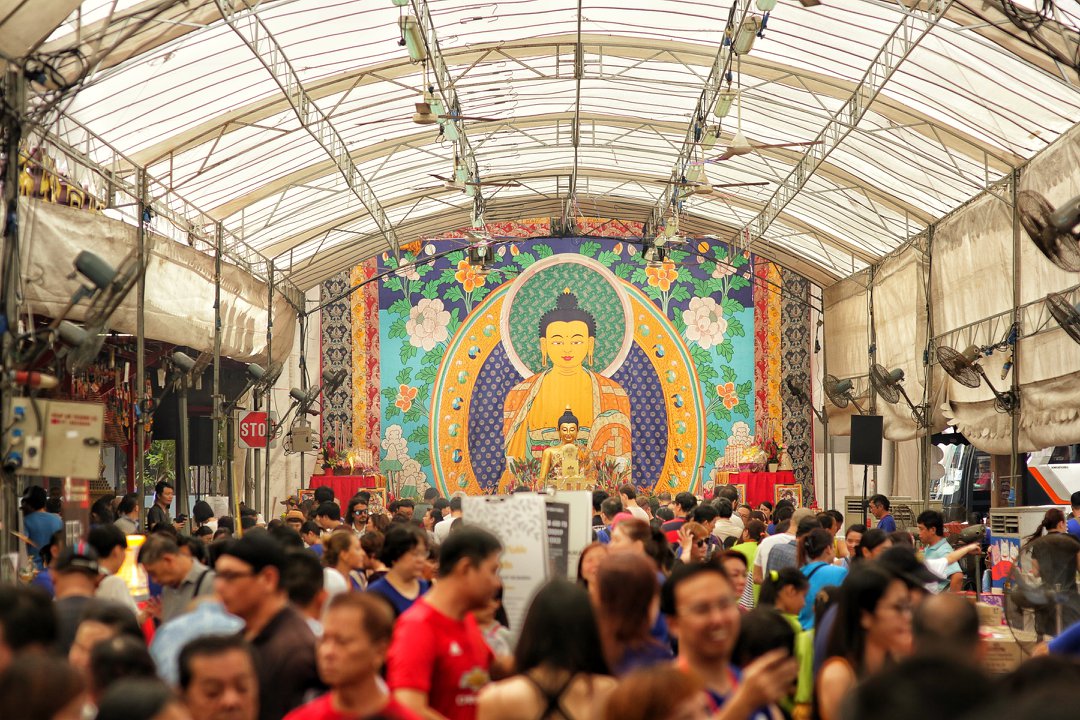It's finally a long weekend thanks to Vesak Day on Sunday, May 19, 2019.
And on this day, traditional rituals with good intent are carried out.
However, some traditional rituals also come with unintended negative impacts on the environment.
A big thing for Buddhists
For those of you who treat Vesak Day like any other public holiday, here's a short introduction into the significance behind this day.
Vesak Day occurs on the day of full moon in the fourth month of the Chinese Lunar calendar, usually in May.
It is the most significant day celebrated by Buddhists to commemorate the birth, enlightenment and death of Buddha.
 Photo by Alvin Toh via Thekchen Choling Singapore / Facebook
Photo by Alvin Toh via Thekchen Choling Singapore / Facebook
On this day, the Buddhist devotees will congregate at temples at dawn, sing hymns to celebrate Buddha, his teachings and his disciples, while monks in saffron robes chant sutras.
They will also bring their own offerings of flowers, candles and incense to the temples as well.
Buddhists believe that good deeds performed on Vesak Day will get them more good karma so devotees will carry out acts of generosity, such as delivering goodies to the poor and needy or releasing caged animals.
This is also the reason behind releasing caged animals on Vesak Day, also known as mercy release -- a ritual whose merits are arguable.
What is mercy release?
Mercy release is known as "fang sheng" (which means "life release" in Chinese) for Chinese Buddhists, or "jiwitte dana" (which means "gift of life" in Sanskrit) for Theravada Buddhists.
Songbirds, pigeons, fishes and terrapins are some of the more common animals released for this purpose.
 Caged munias. Photo from Acres / Facebook
Caged munias. Photo from Acres / Facebook
Mercy release is intended to be an act of compassion, saving the lives of animals previously imprisoned or headed for slaughter.
Illegal to release animals into the wild
However, releasing animals into the wild is actually illegal in Singapore.
Under the Parks and Trees Act, those caught for releasing animals can be fined up to S$50,000, jailed for up to six months, or both.
Which means that one is not supposed to perform mercy release here.
Having said that, there are devotees who still practise mercy release in Singapore.
Hence, the National Parks Board (NParks) has an annual campaign called Operation No Release, introduced in 2006, to stop people from doing so in the nature parks.
That's because, more often than not, mercy release does no good to the environment and the animals that are being "set free".
Not so merciful
Releasing captive animals into the wild could actually set them up for quick deaths, despite the good intentions of Buddhist devotees.
According to The New Paper, which cited a National Parks Board (NParks) advisory, 80 to 90 percent of released animals die within a day, from exhaustion, injury, disease or predation.
A researcher of Buddhism who is a fellow of the Royal Anthropological Institute of Britain, Chan Chow Wah, said:
"Animal release if done in the right context is not an issue, for example, releasing a captured wild animal to its original habitat."
"In urban places like Singapore where animals for sale are bred in captivity, releasing these animals causes suffering as they are unable to survive when they are released."
An avian researcher at the National University of Singapore (NUS), David Tan, also warned that released animals are likely to fall prey to a host of other threats:
"There are also a variety of predators such as eagles, owls, squirrels and even scavengers like crows, that will prey on them."
Back in 2014, more than 100 dead quails at the Central Catchment Nature Reserve were found a week before Vesak Day.
 Photo from NParks
Photo from NParks
Some animals meant for mercy release might be smuggled en masse from far-flung places overseas that also fuels the illegal wildlife trade.
Furthermore, numerous individuals could have suffered or died from stress and harsh conditions during transit.
Upsetting the ecosystem
Not only could mercy releases be harmful to the animals purportedly being given a new lease of life, but the practice could jeopardise local biodiversity.
Non-native animals released can threaten native species and disrupt the ecological balance.
For example, the red-eared sliders, commonly sold in pet shops, are actually notorious for being able to grow into huge sizes over their 30-year lifespan and out-breed native species like the Malayan Box turtle in the wild.
A biological science professor at NUS, Tan Wee Hin elaborated on the impact released animals like red-eared sliders can have on the environment:
"Introducing animals such as red-eared terrapins and fish can change the environment, such as the quality of water, to become harmful to other species and increase the competition for limited resources."
Is releasing insects better?
Some devotees have allegedly turned to releasing insects instead of birds, turtles or fishes, out of convenience and to avoid getting caught.
Here is a picture of numerous boxes of crickets intended for mercy release on Pulau Ubin.
 Photo courtesy of Sean Yap
Photo courtesy of Sean Yap
The impact of releasing insects might be more nuanced than releasing other living creatures, depending on the type and quantity of insects and the location where they are released.
The managing director of a pest management firm Pestroniks Innovation, Carl Baptista, said that spreading out the release of a small number of crickets "won't have much of an impact", but if they are released in large numbers at a single spot, they may spark "a bird frenzy".
Nevertheless, Baptista believes that the release of crickets once a year would not have a large impact on the ecosystem.
However, a 2018 research paper on mass death of crickets at Old Upper Thomson Road suggested otherwise.
The research showed that anthropogenic releases of crickets could alter the feeding behaviour of native predators like long-tailed macaques.
As a result, macaques could be driven away from their natural forest habitats to areas such as roadsides where they are more vulnerable to become roadkill and other human-wildlife conflicts.
Show your compassion in other ways
With greater awareness of the true consequences of mercy release, some Buddhist devotees have forsaken this environmentally-damaging practice borne out of misguided goodwill, by choosing other acts of kindness.
Chan, who is also practising Buddhist, has started a campaign to promote hu sheng ("protect life"), the reverse alternative of fang sheng, at his pet supplies store called Animal Human Alliance.
Instead of mercy release, one can also become vegetarian as suggested by the chairman of the Buddhist federation's education committee, Venerable You Wei:"It will be ironic to consume meat and liberate life. Vegetarianism saves many more animal lives than life liberation."
Other alternatives to accumulate good karma also include planting trees, volunteering, supporting animal welfare groups, adopting pets or paying for the cremation of abused animals.
Top photo from SPCA Hong Kong
If you like what you read, follow us on Facebook, Instagram, Twitter and Telegram to get the latest updates.
